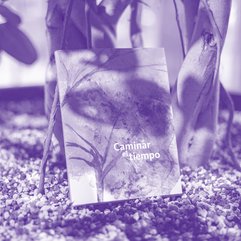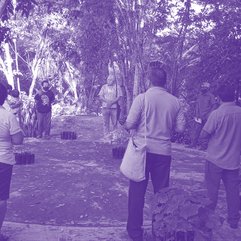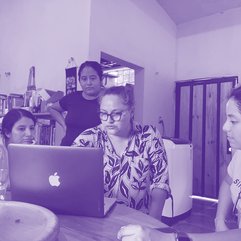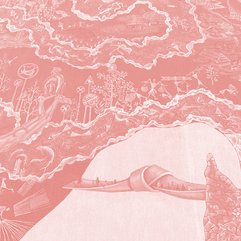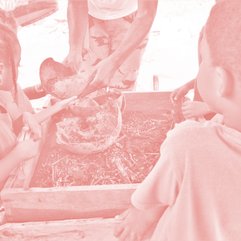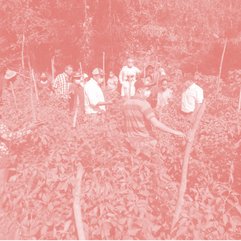Environmental Defiance on Screen
Short film program curated by Şirin Erensoy
17.00-19.30
Save the Date
for adults
multilingual

We are showing four short documentaries on ecology and activism. The films will be accompanied by brief virtual messages from the filmmakers, offering insights into their films, the depicted struggles, their perspectives on eco-cinema, and potential avenues for more ecological filmmaking practices. Following the screening, a discussion will be held with expert guests.
The documentaries show the catastrophic effects of profit-oriented interventions on ecosystems, climate and water on the one hand, and the fight against environmental destruction and possible solutions on the other. The films also illustrate the role of documentary film as a possible instrument of ecological activism and as a medium through which we can gain insights into our collective struggles. What unites the people and communities portrayed in the films shown is the conviction that nature is not an inexhaustible supply of resources and that they question the promise of limitless growth and prosperity.
The selected films show different places, themes and use different sub-genres of documentary film. We are showing an observational documentary that shows the defense of the land and water against hydroelectric dams and mining in Honduras and Guatemala; a documentary portrait that illustrates the energy crisis in Lebanon and a community's creative resistance to it; a video essay that examines the impact of mega-construction projects in Istanbul on the environment and the people living there and shows emerging alliances between activists and local communities. Our fourth film is a manifesto-like call to action that combines music and poetry to create Afrofuturist, activist performance art.
We will show:
Two Rivers, 2023
Directed by Anaïs Taracena & Laura Bermúdez, 44 minutes
Honduras/Guatemala
Language: Spanish and Q'eqchi'
Betty Vásquez Rivera, lives in a community in Honduras that was affected by hurricanes Eta and Iota, together with other women, they organize to resist the extractive projects in their territory. María Caal, a Mayan Q'eqchi' land defender, is part of "La Resistencia" where several families oppose a hydroelectric plant that has blocked the rivers in their communities.
Betty lives in Honduras, María in Guatemala, without knowing each other, one clarity unites them: the defense of the rivers in her territories.
30 Days of Sun, 2023
Directed by Jude Chehab, 12 minutes
Lebanon
Language: Arabic
Faced with precarious access to electricity, one historic village in Lebanon harnesses the power of solar energy in a nation that receives abundant sunlight. Through the lens of an opera singer, a tailor and an environmental activist, we witness how community members seize this opportunity to become independent from private generators, instead installing new and innovative technologies that sustain both everyday life and the planet.
All the Forests of the World are Zones to Defend, 2019
Directed by Julia Lazarus, 18 minutes
Turkey/Germany
Language: Turkish
North of Istanbul the formerly remote areas at the Black Sea are transformed by gigantic infrastructure projects. New motorways cut through the forests, separating pastures from farmland. Rural villages are turned into city suburbs making all agricultural activities illegal within a time span of 5 years. The residents are presented with a fait accompli. Following the completion of the 3rd bridge and the new gigantic airport hub, the construction of the Istanbul Canal is about to begin. The Turkish activist group Kuzey Ormanları Savunması organizes civil resistance against the destruction of the livelihoods shared by urban and rural populations alike. Facing the anger and disappointment of the rural population in countless local grassroots assemblies, the group struggles to establish common goals among the people.
Terra Mater, 2023
Directed by Kantarama Gahigiri, 10 minutes
Language: English / Swahili
Rwanda/Switzerland
Technology and waste, in our lands, our systems, our bones. Wandering our spaces, she cannot help but wonder, where is the space for healing?

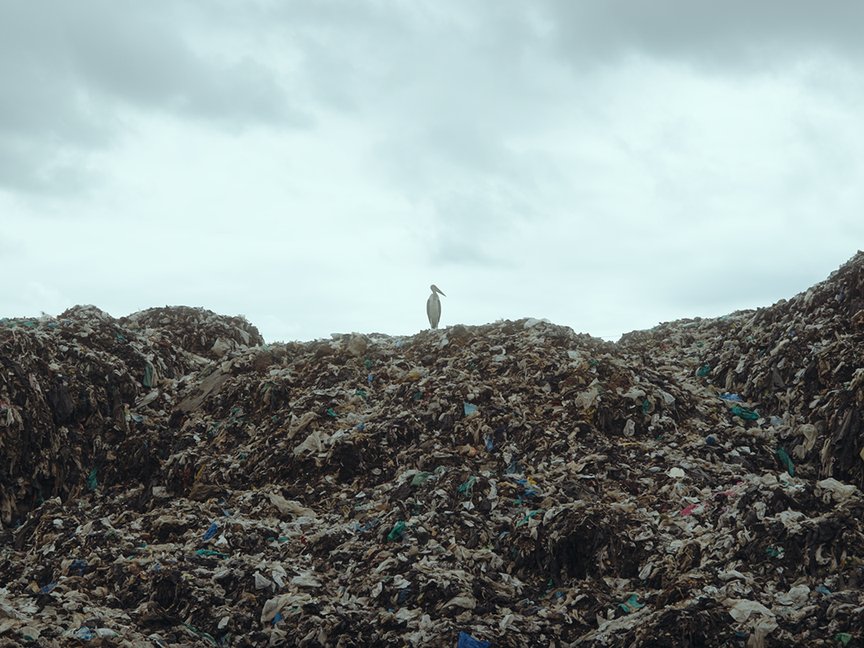 Terra Mater Still
Terra Mater StillŞirin Fulya Erensoy is a film and media scholar and a curator based in Berlin. Her research focuses on video activism, women and documentary filmmaking and genre cinema. She has worked as a lecturer in Film and Television at various institutions in Turkey and completed her Marie Curie Individual post-doctoral fellowship at the Film University Babelsberg Konrad Wolf (September 2021 - August 2023). She supplements her academic work with ongoing practices in documentary film production, film curation and journalism.
Şirin has curated numerous art and film events in cooperation with institutions in Berlin, including the Maxim Gorki Theatre, and the Kunstraum Kreuzberg/Bethanien and has been involved in such as the Hive International Short Film Days and the Sehsüchte International Student Film Festival. Her professional journey also includes her role as anchor for the English news-bulletin This Week in Turkey on the alternative digital media platform Medyascope TV.
In addition to her roles in media and academia, Şirin has worked on international film projects in various capacities such as editing, producing, translating, and researching. Furthermore, she has directed her own short films and videos, some of which have received funding from the Ministry of Culture and Tourism of Turkey, the Turkish Foundation of Cinema and Audiovisual Culture, and Goethe Institut Istanbul.
Martha Hincapié Charry
Berlin-based choreographer, dancer and curator Martha Hincapié Charry studied dance in her home country of Colombia and then completed dance theater and solo dance studies at the Folkwang University in Essen under the direction of Pina Bausch, where she also received a scholarship in 2019. She has already toured with her creations to festivals and theaters in Europe, Asia, North, Central and South America. Martha Hincapié Charry is also the artistic director of the Plataforma/SurReal Festival. In her curatorial practice, she reflects on decolonization processes and forms of survival that artists have experienced during their migration to Europe or as part of local utopias. Through a transdisciplinary reflection on the human body, she opens up a space for dialog between the continents, in which the themes of climate change, (de)colonialism and the relationship between art, people, nature and the visible and invisible world find a platform.
Lisa Hoffman / Klasse Klima
Lisa Hoffman is part of the open, autonomous and transdisciplinary collective Klasse Klima, which communicates the climate crisis and its justice dimensions in education and creative practice. It communicates the climate crisis in art and design practice and education with a focus on issues of justice.
Klasse Klima intervenes in educational politics and creates student-led seminars in art universities. The collective also organises workshops, residencies and exhibitions for art and design practitioners and the broader public. In 2022, the non-profit association arts design climate e.V. was founded for this purpose.
The collective was founded 2019 by students of University of the Arts, Berlin, to establish the confrontation with the climate crisis in art and design education. Its name is a reference to the structure of UdK Berlin.




